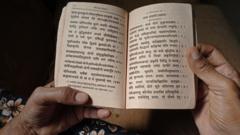In the wake of food shortages in the 1950s and 1960s, India's collaboration with the U.S. government led to a unique initiative transforming grain into enriching library collections. Known as PL-480, this program allowed India to purchase American grain using its local currency, easing its economic troubles and inadvertently funding book purchases for U.S. universities.
Among its beneficiaries, the University of Chicago stands out with its extensive South Asia collection—over 800,000 volumes. Ananya Vajpeyi, a historian and visiting professor, fondly remembers discovering this treasure during her studies. While the initiative sought to alleviate food crises, it simultaneously contributed significantly to the academic landscape of South Asian studies in the U.S. By the end of the program, more than 633,000 items were sent from India, Nepal, and Pakistan.
The process wasn't smooth sailing; it involved a dedicated team in Delhi, adept at navigating India's complex literary landscape. Early years saw a focus primarily on government publications, but by the 1960s, a vast array of fictional and scholarly works thrived, from novels to research materials. However, the program’s conclusion in the '80s shifted the financial responsibility to U.S. libraries, altering the dynamics of resource acquisition.
While the program enriched libraries abroad, concerns have arisen over potential knowledge gaps left within the Indian subcontinent, as many valuable resources became less accessible locally. Still, Vajpeyi celebrates the outcomes of this peculiar exchange, emphasizing the care with which Western libraries preserve their collections. This blend of historical food aid and cultural preservation demonstrates a complex legacy, where one nation’s crisis led to another's academic flourishing.
Among its beneficiaries, the University of Chicago stands out with its extensive South Asia collection—over 800,000 volumes. Ananya Vajpeyi, a historian and visiting professor, fondly remembers discovering this treasure during her studies. While the initiative sought to alleviate food crises, it simultaneously contributed significantly to the academic landscape of South Asian studies in the U.S. By the end of the program, more than 633,000 items were sent from India, Nepal, and Pakistan.
The process wasn't smooth sailing; it involved a dedicated team in Delhi, adept at navigating India's complex literary landscape. Early years saw a focus primarily on government publications, but by the 1960s, a vast array of fictional and scholarly works thrived, from novels to research materials. However, the program’s conclusion in the '80s shifted the financial responsibility to U.S. libraries, altering the dynamics of resource acquisition.
While the program enriched libraries abroad, concerns have arisen over potential knowledge gaps left within the Indian subcontinent, as many valuable resources became less accessible locally. Still, Vajpeyi celebrates the outcomes of this peculiar exchange, emphasizing the care with which Western libraries preserve their collections. This blend of historical food aid and cultural preservation demonstrates a complex legacy, where one nation’s crisis led to another's academic flourishing.






















